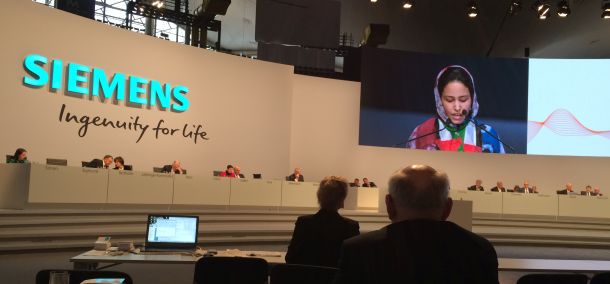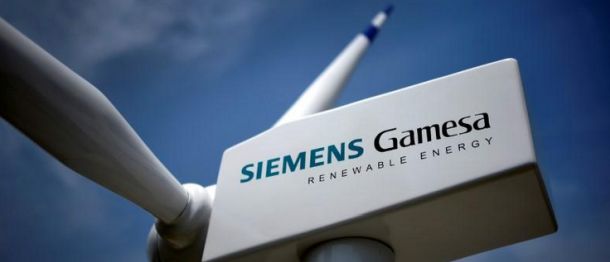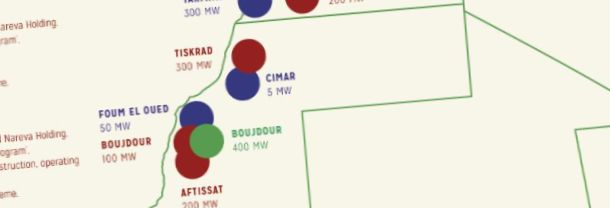
The CEO of Siemens Energy denounces the occupation of Ukraine, but does not “have the mandate to take a political position on such issues or to confirm a territorial status” in the occupied territory of Western Sahara where the company operates for the Moroccan government.
Siemens Energy is speaking with two very different tongues.
At the company's Annual Meeting on 7 February 2023, the CEO of the company Christian Bruch told that Russian invasion of Ukraine is a “a war of aggression in violation of international law”. Bruch also underlined the important statements from the chairman of the company's advisory board Kaeser in which the latter “referred to Russia's invasion of Ukraine by name and condemned the brutally waged war of aggression on Ukraine. We have already done this on previous occasions, so I think we are clear and unequivocal.”
But on Western Sahara - where Siemens Energy has operations - the story is different.

In response to questions on corporate responsibility and as to whether Siemens Energy's involvement lends tacit recognition of Morocco's claim to Western Sahara, the company CEO replied that “as Siemens Energy and Siemens Gamesa, we do not have the mandate to take a political position on such issues or to confirm a territorial status. These matters are the responsibility of governments and international organizations.”
As late as in 2020, Siemens Gamesa referred to the territory as “Southern Morocco”. That is a very different opinion from the UN, the International Court of Justice, the EU Court of Justice, the African Court of Human and Peoples' Rights and the German Government.
Since 2020, different branches of the Siemens structure that are involved in the wind energy projects in occupied Western Sahara, have referred to a legal opinion, which supposedly assesses their involvement as complying with “applicable law, which includes international law".
So far, the Siemens company family has not given any further details about this legal opinion, in terms of the authors, the terms of reference and methodology, and will not share the text for public scrutiny. Siemens Energy maintained that line at yesterday's AGM, stating that it has obtained the legal opinion from “one of the most renowned global law firms”, without naming the firm, adding that “as a matter of policy, Siemens Gamesa does not publish external legal opinions”.
Siemens Energy confirmed that the 300 MW Boujdour plant where Siemens Gamesa turbines (Siemens Gamesa 3,465 MW- 132 m) are at present being erected, will be operational in a few months. That concurs with reports in Moroccan media from earlier this week, describing how the commissioning of an electrical transformation station and other installations at the farm will make it possible to launch the wind farm before the end of the first quarter of this year. The first Kilowatt hours from the already installed wind turbines have reportedly already been tapped on 31 January 2023.
“With the takeover of Siemens Gamesa, Siemens Energy now also bears full responsibility for the Boujdour wind farm. The company can no longer deny its complicity in the illegal exploitation of resources in occupied Western Sahara and the greenwashing of the occupation by Morocco. The green energy transition should not be pushed on the backs of the Saharawis and in favor of corporate profits", Alida Koos of Western Sahara Resource Watch Germany stated in a press release 6 February.
The responses from Siemens Energy came in reply to the questions included below, raised by Emma Lehbib - a Saharawi resident in Germany of the network Saharauische Diaspora in Deutschland - and by Alida Koos of Western Sahara Resource Watch.
- Questions from Emma Lehbib German/English (translation by WSRW)
Answers from Siemens Energy to Emma Lehbib German/English (translation by WSRW) - Questions from Alida Koos German/English (translation by WSRW)
Answers from Siemens Energy to Alida Koos German/English (translation by WSRW)
The young and well-known German environmental activist Luisa Neubauer also made references to Western Sahara during her intervention, expressing concerns that Siemens Energy "does not care about the human rights situation in projects in Western Sahara or Brazil, despite all the warm words about ethical responsibility."
Siemens again refuses to answer questions about Western Sahara at AGM
For the fourth consecutive year, the German engineering company dodges questions at its Annual Shareholders Meeting as to whether it has obtained the consent of the people of Western Sahara to operate on their land.
Siemens fails to respond Western Sahara question at AGM
Why did you not seek permission from my people?, a Saharawi refugee asked at Siemens AGM. Company fails to answer questions why it operates on occupied land.
Siemens: the Moroccan king's wind turbine supplier in Western Sahara
WSRW has again asked Siemens to clarify how they’ve obtained the consent of the people of Western Sahara to their involvement in literally all of Morocco’s wind power plans in the occupied territory.
Moroccan wind energy in occupied Western Sahara passing 40%
Even more wind farms are being planned in occupied Western Sahara, and all of them are in the portfolio of the Moroccan monarch's company NAREVA.



